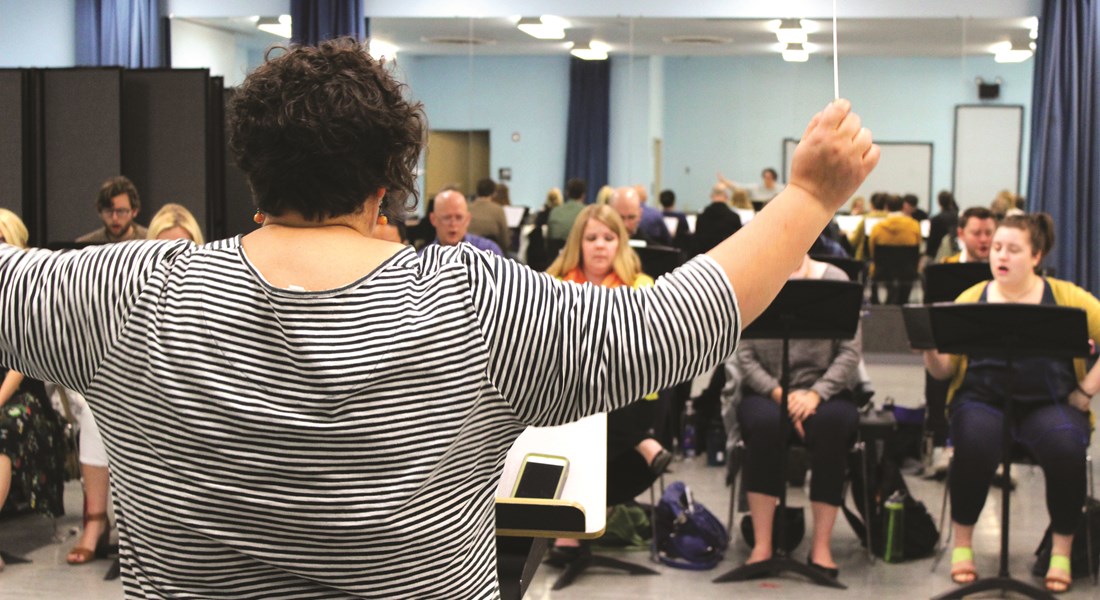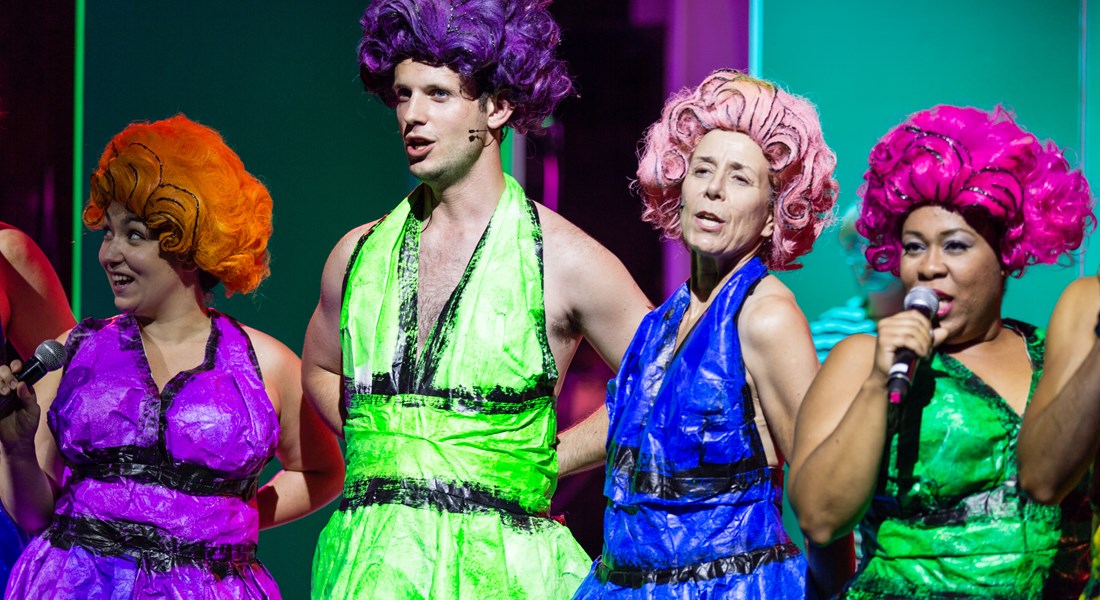Posted24 Aug 2017
- In
Chorus Takes the Spotlight
“Fun and exciting and crazy and scary.”
That’s how Chorus Master Elizabeth Braden sums up her task this fall: lead the Opera Philadelphia Chorus through two festival productions at the same time and, oh, conduct one of them, too.
But the chorus and their fearless leader are ready. After all, they've been through this before, conquering simultaneous fall roles in both a new and a familiar opera. In September 2015, five singers performed in both ANDY: A Popera and La traviata. Last season, six of the dozen male choristers featured in September’s world premiere of Breaking the Waves simultaneously sang in the Turandot chorus, with Braden leading both, every other evening, over two weeks. But it isn’t every day—or every season—that a chorus has the chance to both sing in a mainstage repertoire production and be featured in a new work carefully crafted around their chemistry.
For the inaugural Festival O, the Opera Philadelphia Chorus has double duty, with 32 members singing in the whimsical Komische Oper Berlin production of The Magic Flute and 16 singing in the world premiere run of The Wake World, composed by David Hertzberg specifically to highlight their versatile talents.

Before a polished performance takes the stage, though, it’s time to practice. For a repertory production, the chorus begins rehearsing music about five weeks before opening night. Throughout the process, in addition to running chorus rehearsals, Braden and assistant chorus master Emily May Sung also assist the conductor during orchestra rehearsals. (Since neither Braden or Sung could be in two places at once, O17 rehearsals required extra staff and lots of planning. “It’s one big puzzle,” Braden said.)
For a new work, music rehearsals also begin about five weeks in advance. But unlike a repertory production, where the chorus may have performed the role before or have recordings handy to help with memorization, this music is brand new. Thus, they get their hands on the score as soon as possible to begin practicing.
Luckily, many members of the final Wake World cast and chorus have been involved in “workshopping” the new opera.
During a workshop, singers and musicians gather with the creative team of a new work—in this case Hertzberg, dramaturge Julia Bumke, and director R. B. Schlather—to play the written music aloud and work through edits or changes. Workshops provide the composer with a live canvas on which to experiment with their piece and, for The Wake World, the opportunity to draw on the skills of the artists in the room.
Chorister Veronica Chapman-Smith, who is also Opera Philadelphia’s Community Initiatives Administrator, has sung in new works like A Coffin in Egypt and ANDY: A Popera in the past. She loved participating in workshops for The Wake World.
“It’s been awesome. I’ve gotten to work with most of the music ahead of time and really live in [David Hertzberg’s] language. It really enriches the experience because you feel like you understand what he’s trying to say,” she said.
Chorister John David Miles, a ten-year vet of the Opera Philadelphia chorus who has sung in and workshopped new works like ANDY and Breaking the Waves, agrees.
“The involvement and use of the chorus for these new works and the workshops—I love the workshops—and the availability to do small roles once in a while, it’s just really been a pleasure to be part of it,” he said.
“Where you see over the course of the three or four workshops how things get refined from one to the other, how things work and what doesn’t, and then to be involved in the final product...Just to know that you own this little bit of what’s going on is a very humbling and powerful thing to feel.”

Not only is the chorus heavily involved in The Wake World— in addition to the ensemble and principal soloists Rihab Chaieb and Maeve Höglund, seven choristers take up individual roles—but they’re also utilized in unorthodox ways.
“The choral part of it is very instrumental,” Miles said. “It’s not traditional like a La bohème or Carmen chorus. There are not a lot of words for the chorus; there’s a lot of oohs and aahs where we’re supporting the singers as an orchestra does—which presents numerous challenges, the least of which is memorization. Without words, to memorize pages and pages of oohs and ahhs in a choral setting is interesting.”
“It’s a great opportunity for them to show off,” Braden said.
The Barnes Foundation serves as The Wake World’s unusual setting, but unlike a traditionally staged opera, here the cast will move throughout the space and, at times, mingle with the audience.
“Bringing the performance into the midst of the audience is something that’s uncomfortable for both the performer and the audience,” Miles said, “but the take away from that can be so much more than just them sitting in a seat and us standing on a stage.”
To pull off such a feat, both technically as artists and emotionally as co-workers, takes a special group. For Braden, building a team with the requisite chemistry has taken a keen ear and eye.
“You always have people that can sing really well and have good stage presence, but it’s also for me been really important to find people that are really collaborative and get along with everybody,” Braden said.
And, if The Wake World is any indication, Braden’s ideal chorus chemistry has come to fruition.
“We’re very supportive of each other. It’s really like my second family,” Chapman-Smith said. “It’s like working with brothers and sisters. Sometimes we fight, but we always have each other’s best interests at heart and defend each other to the bitter end...That’s the beauty of family.”
Leave your comment below.

 Facebook
Facebook Twitter
Twitter More
More